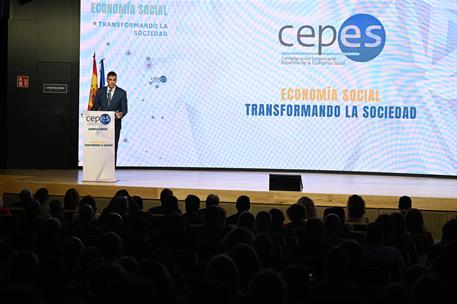Council of Ministers
Government of Spain approves spending ceiling and improves economic growth forecast
Council of Ministers - 2024.7.16
Moncloa Palace, Madrid
The First Vice-President and Minister for Treasury, María Jesús Montero, the Minister for Education, Vocational Training and Sports and Government Spokesperson, Pilar Alegría, and the Minister for Economy, Trade and Enterprise, Carlos Cuerpo (Fotos: Pool Moncloa / José Manuel Álvarez)
The Council of Ministers has set the stability targets for the period 2025-2027 and the non-financial expenditure limit for general government for 2025.
The First Vice-President and Minister for Treasury, María Jesús Montero, has stated that this step is decisive for drawing up the General State Budget for 2025, which will be presented "in time and form" so that it can be approved before 31 December. The new public accounts, she stressed, "will respect the new application of European fiscal rules by maintaining budgetary stability, and will be compatible with continuing to promote the welfare state".
Non-financial expenditure ceiling for 2025
María Jesús Montero has advanced that the national non-financial spending limit, or the spending ceiling, without including European funds will reach just over €195.35 billion, 3.2% more than in 2024, specifically almost €6.14 billion more. "This is a significant but prudent increase, which anticipates our commitment to fiscal responsibility and to strengthening the public services, health, education, pensions and dependency", she remarked.
The First Vice-President and Minister for Treasury, María Jesús Montero, during her speech at the press conference after the Council of Ministers | Fotos: Pool Moncloa / José Manuel Álvarez
The total non-financial expenditure ceiling, including European funds, stands at just over €199.17 billion. The vice-president pointed out that, as foreseen in the addendum to the Recovery, Transformation and Resilience Plan, Spain will receive more loans from the NextGenerationEU funds and fewer transfers, as provided for in the expenditure ceiling. The aim is to compensate for this reduction with the growth of the national budget, said Montero, who considers that "European funds continue to be an essential lever for the transformation of our production model, fundamentally in digitalisation, green transition and territorial cohesion".
Regarding funds from Europe, María Jesús Montero added that up to the beginning of July, €12.5 billion had been authorised, 35% of the appropriations budgeted for this year. She also recalled that the last €10 billion requested are expected to be disbursed during the course of the year.
Meanwhile, the Minister for Treasury announced that the State will transfer just over €22.88 billion to the Social Security in 2025, 7% more than this year, thereby complying with the recommendations of the Toledo Pact and guaranteeing the sustainability of the system. "This government has also complied with its commitment to progressively increase the pension fund", she pointed out.
New deficit and public debt paths
Montero recalled that the Government has reduced the public deficit by €60 billion since 2020, managing to close 2023 with a deficit of 3.6%, a figure lower than that committed to the European Commission. The forecast, she said, is to close 2024 with a deficit close to 3%.
The deficit target for general government as a whole is set at 2.5% in 2025, 2.1% in 2016 and 1.8% in 2023. The vice-president stressed that it is a path that requires a greater fiscal effort, which will be assumed in its entirety by the state, thereby favouring a greater budgetary margin for the autonomous communities and local entities.
The central government's target for 2025 is 2.2%, which is 8 tenths of a percentage point lower than the 2024 target. In 2026 it has to reduce its deficit to 1.8% and in 2027 to 1.5%.
Regarding the deficit target for the autonomous communities, it will be -0.1% of GDP in 2025, 2026 and 2027, giving them two tenths of a percentage point more fiscal margin for next year. María Jesús Montero stressed that this higher margin will be complemented by just over €147.41 billion in 2025 in payments on account, 9.5% more than in 2025 and "the largest in our history. If we take into account the liquidation of 2023, which is added to that amount, the total financing of the communities rises to almost €158.17 billion, which is a new record of resources for the whole," she added.
The target for local authorities will be to balance between 2025 and 2027. In addition, they will also receive the highest ever payments on account, just over €26.89 billion in 2025, 13.1% more than in 2024.
Meanwhile, Social Security will maintain a deficit target of 0.2% over the next three years. Montero stressed that "it is a commitment that is compatible with the updating of pensions in line with the Consumer Price Index (CPI) registered each year, and with the current commitment to our senior citizens that they should not lose purchasing power".
Expenditure rule
The minister for finance detailed that the expenditure rule is set at 3.2% for 2025, 3.3% for 2026 and 3.4% for 2027. These figures are consistent with the growth rate of net primary expenditure, the main variable of the new European fiscal rules, which will be included in the Structural Fiscal Plan to be submitted to the European Commission.
María Jesús Montero concluded by pointing out that "the General State Budget for 2025 goes further in consolidating rights, in strengthening the middle and working classes and in promoting the transformation of our productive fabric".
Reduction of public debt
The Government has also presented the new public debt path 2025-2027, which remains on a downward path in the coming years, and which will be below 100% in 2027. Specifically, the document establishes that general government debt should be reduced to 103.6% of GDP in 2025, to 101.8% in 2026 and to 99.7% in 2027.
The Minister for Economy, Trade and Enterprise, Carlos Cuerpo, has highlighted that by the end of 2024 the debt to GDP ratio will have fallen 20 percentage points in the last four years, to below 100%. "This is another of the great objectives of the legislature: in 2027 to have recovered the fiscal space that we consumed as a result of the response to COVID-19," he said.
Growth forecast improves
The Minister for Economy, Trade and Enterprise, Carlos Cuerpo, during the press conference after the Council of Ministers | Fotos: Pool Moncloa / José Manuel Álvarez
Carlos Cuerpo has presented a report on the economic situation, which includes a new macroeconomic scenario and economic and fiscal forecasts up to 2027.
The minister stressed that "the Spanish economy will continue to grow at a high rate in the coming years", thanks to the dynamism of its main economic indicators, especially employment, which has set a record in the first half of the year, with 21.1 million new recruits in seasonally adjusted terms.
In light of this, the Government has revised upwards its forecast for GDP growth to 2.4% in 2024, in line with the forecasts of the main national and international organisations. Moreover, the Executive forecasts that it will grow up to 2.2% in 2025 and up to 2% in 2026 and 2027.
Mr Cuerpo stressed that this means that "Spain will be the engine of growth among the major European economies, not only in the short term, but also in the future".
Employment, investment and exports
The minister argued that there are three vectors underpinning the improved growth prospects: employment, investment and the external sector.
With regard to labour market developments, forecasts suggest that around one million new jobs will be created between 2024 and 2025, reaching the historic figure of 22 million employed in 2025. Carlos Cuerpo has indicated that this figure has a positive impact on the resilience of households to shocks such as higher inflation and higher interest rates. Moreover, the unemployment rate will progressively fall to levels below 9% in 2027, which is known as full employment.
Likewise, the Minister for Economy stressed that workers will continue to be incorporated into the labour market, with a substantial increase in the activity rate and an improvement in real hourly productivity: "This is another of the great challenges facing the Spanish economy, to be able to grow by incorporating new citizens into the labour market in a way that is compatible with an increase in the productivity of our companies".
According to the minister, the improvement in hourly productivity is compatible with one of the main objectives of the legislature: to progressively reduce working hours and improve workers' pay.
In terms of investment, Cuerpo said that the report shows that it will accelerate in 2024 and 2025, recovering to pre-pandemic levels, thanks to increased business confidence and the momentum of the Recovery, Transformation and Resilience Plan.
With regard to the evolution of the foreign sector, the minister announced that the financing capacity will remain above 2% of GDP until 2027 thanks to the good evolution of exports in both tourism and non-tourism services.
Civil Service Law and investment in health and microelectronics
The Minister for Education, Vocational Training and Sports and Government Spokesperson, Pilar Alegría, during her speech at the press conference after the Council of Ministers | Fotos: Pool Moncloa / José Manuel Álvarez
The Minister for Education, Vocational Training and Sports and Government Spokesperson, Pilar Alegría, has reported on the approval by the Council of Ministers of the draft Civil Service Law, with which "progress is being made on a new legal framework to transform the administration". The text, which addresses issues such as access to public employment, careers, lifelong learning and professional ethics, has been "thoroughly discussed" with workers' representatives.
Furthermore, the Council of Ministers has given the go-ahead to the setting up of the Sociedad Española para la Transformación Tecnológica (SEET), which will manage nearly €20 billion from the Recovery, Transformation and Resilience Plan aimed, above all, at boosting the microelectronics sector and financially supporting pioneering products and services of technological and audiovisual companies.
Alegría also reported that the Council of Ministers has approved the distribution of more than €172 million to the autonomous communities to strengthen primary care, "the true heart of our health system". This funding will focus on training health professionals, improving coordination and acquiring new medical equipment. In the same area, the spokesperson confirmed that the Executive has authorised the contracting of the €281 million for the fractioning of donor plasma.
"It is a fact that our country has been self-sufficient in blood components for transfusion for three decades, but has a deficit in plasma, so with this contribution we will continue to improve this aspect and consequently the care of many patients in our country," she explained.
Triumph of Spanish sport: EURO, Wimbledon and Paris 2024
The Minister for Sports began her speech at the press conference by congratulating the Spanish national football team on its victory in the European Championship held in Germany, and the tennis player Carlos Alcaraz, proclaimed champion at Wimbledon on the same day.
Pilar Alegría highlighted Spain's "sporting excellence" in both disciplines, the national team and Alcaraz "making all Spaniards enjoy themselves" this weekend. In the days leading up to the start of the Olympic Games in Paris, the minister has also sent a message of encouragement to all the Spanish athletes, of whom, Alegría assures us, the Government feels "deeply proud". "We have no doubt that we are going to improve and surpass the 22 medals we won at the Barcelona Olympics," she concluded.
Commitment to gender-based violence
Pilar Alegría also referred to the latest confirmed victims of gender violence in Spain, where 6 new cases of gender violence have been registered in the last few days. The minister described the situation as "extremely serious".
"Since 2003, 1,271 women have been murdered by their partners or ex-partners", she recalled, "a terrible situation" faced with which the Executive wishes to express its "firm commitment to continue fighting against the violence suffered by women" to "not to take a step backwards in this area".
Non official translation






